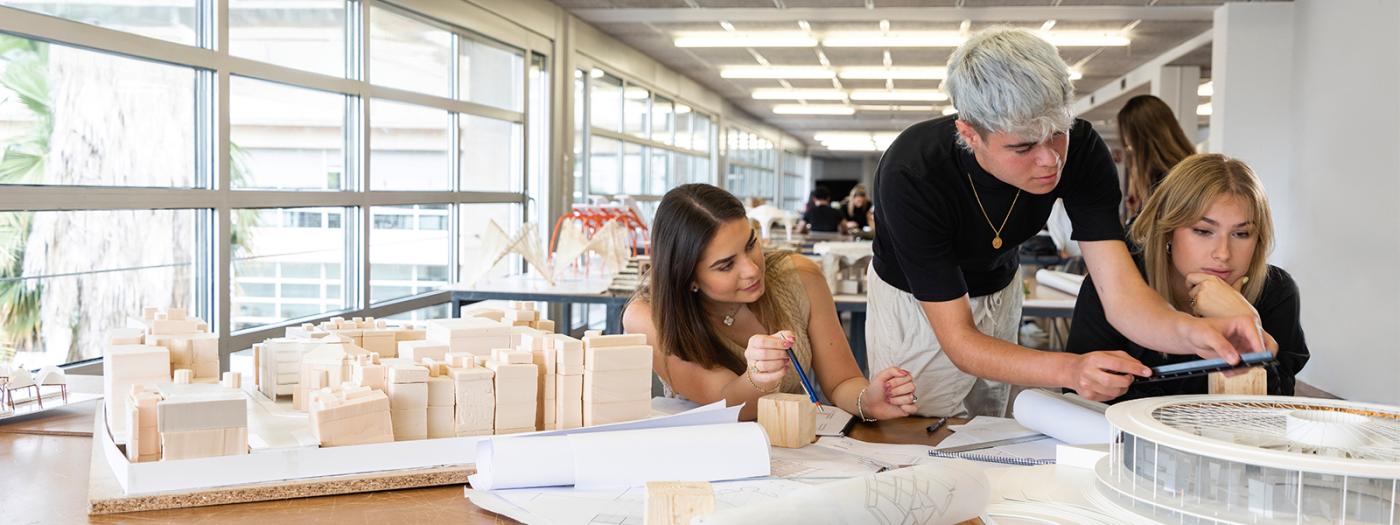The structure of the Degree in Architecture consists of a total of 6 years (3+2+1), divided into three parts: two cycles and an enabling master's degree that, when successfully completed by the student, enables them to obtain the degree in architecture, and full skills to sign their own projects.
The first cycle lasts three years, and its horizontal development includes the basic subjects and full skills to sign their own projects., which are the foundations that establish the core knowledge of the teaching of Architecture: drawing, structures, descriptive geometry, history, etc. During the first stage, the topics that will enable the student to experiment later with the design processes are acquired and consolidated, guaranteeing technical and cultural accuracy when designing. The classes are given in specialized classrooms and in the Design Studio; the contents are evaluated annually in the first introductory year and semester in the second and third year.
With a methodology based on personalization, as the studies progress, students can choose the way of investigating Architecture that best suits their individual sensibilities. The second cycle fosters greater synergy between courses by proposing a vertical development (pillars) in 4 semesters, during which fourth- and fifth-year students acquire the ability to personalize their studies, while sharing the processes related to the project design.
The enabling master concentrates the knowledge acquired over the previous 5 years to test the student's abilities before discovering [and discovering oneself] the labor market, and face the complexity and difficulties of carrying out a work of architecture, that is, knowing how to execute your project on a 1:1 scale.
SMART LEARNING
A NEW EDUCATIONAL MODEL FOR A NEW NORMAL
This new normal requires a new way of teaching and learning, adapted to a changing and uncertain situation that demands flexible, intelligent and technological learning that adapts to all the students’ new educational needs.
La Salle Campus Barcelona - Ramon Llull University endorses the new Smart Learning model and takes another step in its innovative DNA, affecting all areas of the educational process: the service to the students, international exchanges, remote internships, the telework model applied to internships with companies, the job bank and research projects.
What is the new Smart Learning model?
State-of-the-art technology has been implemented in the classrooms that will allow students, both national and international, who cannot get to the Campus to attend and participate in classes without being physically in the classroom. The sessions given with on-site students will be broadcast live over the Internet and those who attend virtually will be projected on screens so that teachers and on-site students can see and interact with them. All students, both on-site and those who cannot come to the campus, will form a single group while maintaining the same academic schedule and contact with their classmates and teachers.
With the new Smart Learning model, students will have a training which will be:
- Personalized, because it adapts to the student and their needs or circumstances, regardless of the health scenario.
- Flexible, because it overcomes the barriers of the online or face-to-face methods with a platform that allows face-to-face, blended and distance learning.
- Intelligent, because it is a new way of teaching and learning that combines physical and interactive experiences.
- Technological, in order to implement the Smart Learning methodology, classrooms have been transformed into Smart Classrooms, which consist of:
- Audio system with more than 8,000 virtual microphones per classroom
- Cameras equipped with artificial intelligence
- Smart Boards to share content to and from the Smart Classroom, enhancing collaborative work.
Smart Learning on a Smart Campus
Work has also been done to adapt all the infrastructures to create a Smart Campus (classrooms, laboratories, incubator, research infrastructures, common areas, services, student residence, fitness center, gardens ...) so that they are also sustainable and environmentally friendly spaces. Temperature controls, hand sanitizer dispensers, special soaps have also been installed, and cleaning protocols have been increased and modified, among other measures.
At La Salle - Universitat Ramon Llull we make every effort to offer students quality education and a university experience without barriers, wherever you are.
